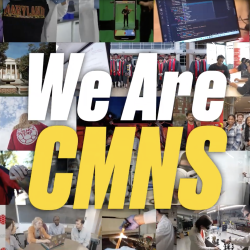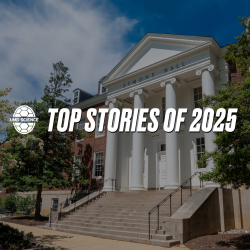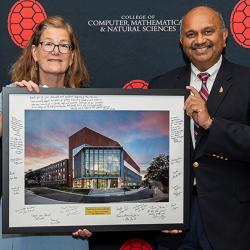Lai-Xi Wang Named Fellow of The American Chemical Society
The honor recognizes Wang’s groundbreaking contributions to glycoscience and his leadership in the society’s carbohydrate chemistry division.
University of Maryland Chemistry and Biochemistry Professor Lai-Xi Wang has been named Fellow of the American Chemical Society (ACS). The prestigious honor is awarded to members of the society who have demonstrated excellence and leadership both in the field of chemistry and in service to the ACS community.
“Selection as a Fellow of the American Chemical Society is an immense honor,” said Janice Reutt-Robey, chair of UMD’s Department of Chemistry and Biochemistry. “The list of ACS Fellows is extremely small and consists of the most professionally accomplished chemists in the world. We are extremely proud of Lai-Xi for this well-deserved recognition.”
Wang is being recognized for his pioneering work to understand glycoprotein structure and function and his application of that work to the development of antibody-based therapeutics and an HIV vaccine. For his contribution to the ACS community, Wang is being recognized for volunteer service to the ACS’ Division of Carbohydrate Chemistry, where he served as chair from 2015 to 2017.
“I am very honored to receive this recognition from the American Chemical Society,” Wang said. “It is really a recognition of the hard work of so many people, including the graduate students and postdoctoral fellows who have been working in my lab for the past 20 years. We are always building on work that has gone before us, and it is through continued collaboration that we have been able to make progress and move forward in this field.”
Wang joins two colleagues in the Department of Chemistry and Biochemistry who are ACS Fellows: Catherine Fenselau and Alice Mignerey.
Wang is a leading carbohydrate chemist with expertise in glycoscience (the study of carbohydrates), enzymology and immunology. He conducts research on the structure and biological function of glycoproteins, which are proteins with carbohydrates (sugar molecules) attached to them. His focus is on antibodies, a complex class of glycoproteins in immune systems in which the structure of the sugar group plays an important role in determining the antibody’s function.
“In biological systems, carbohydrates, proteins and nucleic acids—DNA and RNA—all work together,” Wang said. “To understand these living systems, we have proteomics looking at proteins and we have genomics focusing on nucleic acids. Now is the time for glycomics to understand the structure and function of carbohydrates.”
Wang’s glycomics research provided a major breakthrough for the field of immunology in 2017 when he developed an efficient method for using enzymes to chemically produce antibodies with well-defined, homogeneous sugar groups. Antibodies with identical proteins often have slight differences in their attached sugar groups, which can significantly impact their function. By enabling scientists to reliably produce antibodies with homogeneous sugar groups, Wang’s work opens the door for studying how the structure of sugar groups affect antibody function at the molecular level. His method is now being used by researchers throughout the world.
In HIV research, Wang and his colleagues are working to design an effective vaccine that targets weaknesses in the virus’s glycoprotein structure. The HIV glycoprotein is a protein surrounded by protective sugar molecules that mimic sugars in the human body and trick the immune system into not attacking. Wang’s work has identified the slight variation between HIV glycoprotein sugars and host sugars. By targeting this variation, the vaccine he is developing has induced an immune system attack on HIV’s sugar coating in rabbits. Now, Wang’s group and their collaborators plan to test the conjugate vaccine in non-human primates in the next few months.
Wang receives significant research funding from the National Institutes of Health (NIH) and currently holds three active NIH R01 grants and several other collaborative grants.
“Lai-Xi’s research program is opening up new space for the chemical and functional studies of glycoproteins and other glycoconjugates, and is at the frontier of our discipline,” said Reutt-Robey.
In addition to foundational research, Wang is passionate about translating the knowledge his lab gains into real-world applications. His work focuses on improving the therapeutic efficacy of immunotherapies by targeting monoclonal antibodies and other therapeutic glycoproteins. Wang has been awarded 15 U.S. and international patents for his inventive methods and new technologies.
In 2015, he founded the startup company GlycoT Therapeutics to further develop new therapeutic technologies. The company has been awarded four Small Business Innovation Research (SBIR) grants in the past three years from the U.S. government, including one to develop an improved anti-inflammatory drug.
During his tenure as chair of the carbohydrate chemistry division of the ACS, Wang was proactive in fostering interaction among ACS divisions and reaching out to the membership. Among his many initiatives was the establishment of the Derek Horton Award in Industrial Carbohydrate Chemistry to acknowledge distinguished achievements in and outstanding contributions to industrial carbohydrate chemistry.
Wang came to the University of Maryland, College Park in 2015 from the University of Maryland School of Medicine where he worked at the Institute of Human Virology. He transitioned to College Park with the goal of strengthening and leading efforts to develop new research programs centered on chemical biology, a field that applies chemical tools and ideas to biological and medical problems.
“I saw unique opportunities here to build new programs and develop collaborations with other departments and colleges here at College Park. In addition, I have more opportunities to teach and train students here,” said Wang, who has been teaching undergraduate organic chemistry (Chem241) each year since his arrival in College Park.
Wang received his Ph.D. from the Chinese Academy of Sciences’ Shanghai Institute of Organic Chemistry. After postdoctoral studies at Johns Hopkins University and the Massachusetts Institute of Technology, he joined the Institute of Human Virology at the University of Maryland School of Medicine as an assistant professor in 2000. He was promoted to associate professor in 2005 and to professor in 2009.
Wang received the 2014 Melville L. Wolfrom Award and the 2004 Young Investigator Award in Carbohydrate Chemistry, both from the American Chemical Society. He was inducted into the prestigious Johns Hopkins University Society of Scholars in 2009 and was named a Fellow of the American Association for the Advancement of Science in 2014.
Read more about Wang and his work here:
New Molecule Shows Promise in HIV Vaccine Design
Vaccine candidate spurs animals to produce antibodies against protective sugars of multiple HIV strains.
New Method Enables Creation of Better Therapeutic Antibodies
Technique to standardize sugar groups could lead to better quality control, customization.
Chemistry and Biochemistry’s Lai-Xi Wang Named AAAS Fellow
Wang was honored for “distinguished contributions to the field of carbohydrate chemistry and glycobiology, particularly for development of new chemoenzymatic methods for glycosylation engineering of therapeutic proteins.”
College Welcomes Five New Faculty Members this Spring
Andrew Childs, Kelly Hamby, Philip Lee Falk Johnson, Michelle Mazurek and Lai-Xi Wang join the
college.
The honor recognizes Wang’s groundbreaking contributions to glycoscience and his leadership in the society’s carbohydrate chemistry division.
University of Maryland Chemistry and Biochemistry Professor Lai-Xi Wang has been named Fellow of the American Chemical Society (ACS). The prestigious honor is awarded to members of the society who have demonstrated excellence and leadership both in the field of chemistry and in service to the ACS community.
“Selection as a Fellow of the American Chemical Society is an immense honor,” said Janice Reutt-Robey, chair of UMD’s Department of Chemistry and Biochemistry. “The list of ACS Fellows is extremely small and consists of the most professionally accomplished chemists in the world. We are extremely proud of Lai-Xi for this well-deserved recognition.”
Wang is being recognized for his pioneering work to understand glycoprotein structure and function and his application of that work to the development of antibody-based therapeutics and an HIV vaccine. For his contribution to the ACS community, Wang is being recognized for volunteer service to the ACS’ Division of Carbohydrate Chemistry, where he served as chair from 2015 to 2017.
“I am very honored to receive this recognition from the American Chemical Society,” Wang said. “It is really a recognition of the hard work of so many people, including the graduate students and postdoctoral fellows who have been working in my lab for the past 20 years. We are always building on work that has gone before us, and it is through continued collaboration that we have been able to make progress and move forward in this field.”
Wang joins two colleagues in the Department of Chemistry and Biochemistry who are ACS Fellows: Catherine Fenselau and Alice Mignerey.
Wang is a leading carbohydrate chemist with expertise in glycoscience (the study of carbohydrates), enzymology and immunology. He conducts research on the structure and biological function of glycoproteins, which are proteins with carbohydrates (sugar molecules) attached to them. His focus is on antibodies, a complex class of glycoproteins in immune systems in which the structure of the sugar group plays an important role in determining the antibody’s function.
“In biological systems, carbohydrates, proteins and nucleic acids—DNA and RNA—all work together,” Wang said. “To understand these living systems, we have proteomics looking at proteins and we have genomics focusing on nucleic acids. Now is the time for glycomics to understand the structure and function of carbohydrates.”
Wang’s glycomics research provided a major breakthrough for the field of immunology in 2017 when he developed an efficient method for using enzymes to chemically produce antibodies with well-defined, homogeneous sugar groups. Antibodies with identical proteins often have slight differences in their attached sugar groups, which can significantly impact their function. By enabling scientists to reliably produce antibodies with homogeneous sugar groups, Wang’s work opens the door for studying how the structure of sugar groups affect antibody function at the molecular level. His method is now being used by researchers throughout the world.
In HIV research, Wang and his colleagues are working to design an effective vaccine that targets weaknesses in the virus’s glycoprotein structure. The HIV glycoprotein is a protein surrounded by protective sugar molecules that mimic sugars in the human body and trick the immune system into not attacking. Wang’s work has identified the slight variation between HIV glycoprotein sugars and host sugars. By targeting this variation, the vaccine he is developing has induced an immune system attack on HIV’s sugar coating in rabbits. Now, Wang’s group and their collaborators plan to test the conjugate vaccine in non-human primates in the next few months.
Wang receives significant research funding from the National Institutes of Health (NIH) and currently holds three active NIH R01 grants and several other collaborative grants.
“Lai-Xi’s research program is opening up new space for the chemical and functional studies of glycoproteins and other glycoconjugates, and is at the frontier of our discipline,” said Reutt-Robey.
In addition to foundational research, Wang is passionate about translating the knowledge his lab gains into real-world applications. His work focuses on improving the therapeutic efficacy of immunotherapies by targeting monoclonal antibodies and other therapeutic glycoproteins. Wang has been awarded 15 U.S. and international patents for his inventive methods and new technologies.
In 2015, he founded the startup company GlycoT Therapeutics to further develop new therapeutic technologies. The company has been awarded four Small Business Innovation Research (SBIR) grants in the past three years from the U.S. government, including one to develop an improved anti-inflammatory drug.
During his tenure as chair of the carbohydrate chemistry division of the ACS, Wang was proactive in fostering interaction among ACS divisions and reaching out to the membership. Among his many initiatives was the establishment of the Derek Horton Award in Industrial Carbohydrate Chemistry to acknowledge distinguished achievements in and outstanding contributions to industrial carbohydrate chemistry.
Wang came to the University of Maryland, College Park in 2015 from the University of Maryland School of Medicine where he worked at the Institute of Human Virology. He transitioned to College Park with the goal of strengthening and leading efforts to develop new research programs centered on chemical biology, a field that applies chemical tools and ideas to biological and medical problems.
“I saw unique opportunities here to build new programs and develop collaborations with other departments and colleges here at College Park. In addition, I have more opportunities to teach and train students here,” said Wang, who has been teaching undergraduate organic chemistry (Chem241) each year since his arrival in College Park.
Wang received his Ph.D. from the Chinese Academy of Sciences’ Shanghai Institute of Organic Chemistry. After postdoctoral studies at Johns Hopkins University and the Massachusetts Institute of Technology, he joined the Institute of Human Virology at the University of Maryland School of Medicine as an assistant professor in 2000. He was promoted to associate professor in 2005 and to professor in 2009.
Wang received the 2014 Melville L. Wolfrom Award and the 2004 Young Investigator Award in Carbohydrate Chemistry, both from the American Chemical Society. He was inducted into the prestigious Johns Hopkins University Society of Scholars in 2009 and was named a Fellow of the American Association for the Advancement of Science in 2014.
Read more about Wang and his work here:
New Molecule Shows Promise in HIV Vaccine Design
Vaccine candidate spurs animals to produce antibodies against protective sugars of multiple HIV strains.
New Method Enables Creation of Better Therapeutic Antibodies
Technique to standardize sugar groups could lead to better quality control, customization.
Chemistry and Biochemistry’s Lai-Xi Wang Named AAAS Fellow
Wang was honored for “distinguished contributions to the field of carbohydrate chemistry and glycobiology, particularly for development of new chemoenzymatic methods for glycosylation engineering of therapeutic proteins.”
College Welcomes Five New Faculty Members this Spring
Andrew Childs, Kelly Hamby, Philip Lee Falk Johnson, Michelle Mazurek and Lai-Xi Wang join the
college.
The honor recognizes Wang’s groundbreaking contributions to glycoscience and his leadership in the society’s carbohydrate chemistry division.
University of Maryland Chemistry and Biochemistry Professor Lai-Xi Wang has been named Fellow of the American Chemical Society (ACS). The prestigious honor is awarded to members of the society who have demonstrated excellence and leadership both in the field of chemistry and in service to the ACS community.
“Selection as a Fellow of the American Chemical Society is an immense honor,” said Janice Reutt-Robey, chair of UMD’s Department of Chemistry and Biochemistry. “The list of ACS Fellows is extremely small and consists of the most professionally accomplished chemists in the world. We are extremely proud of Lai-Xi for this well-deserved recognition.”
Wang is being recognized for his pioneering work to understand glycoprotein structure and function and his application of that work to the development of antibody-based therapeutics and an HIV vaccine. For his contribution to the ACS community, Wang is being recognized for volunteer service to the ACS’ Division of Carbohydrate Chemistry, where he served as chair from 2015 to 2017.
“I am very honored to receive this recognition from the American Chemical Society,” Wang said. “It is really a recognition of the hard work of so many people, including the graduate students and postdoctoral fellows who have been working in my lab for the past 20 years. We are always building on work that has gone before us, and it is through continued collaboration that we have been able to make progress and move forward in this field.”
Wang joins two colleagues in the Department of Chemistry and Biochemistry who are ACS Fellows: Catherine Fenselau and Alice Mignerey.
Wang is a leading carbohydrate chemist with expertise in glycoscience (the study of carbohydrates), enzymology and immunology. He conducts research on the structure and biological function of glycoproteins, which are proteins with carbohydrates (sugar molecules) attached to them. His focus is on antibodies, a complex class of glycoproteins in immune systems in which the structure of the sugar group plays an important role in determining the antibody’s function.
“In biological systems, carbohydrates, proteins and nucleic acids—DNA and RNA—all work together,” Wang said. “To understand these living systems, we have proteomics looking at proteins and we have genomics focusing on nucleic acids. Now is the time for glycomics to understand the structure and function of carbohydrates.”
Wang’s glycomics research provided a major breakthrough for the field of immunology in 2017 when he developed an efficient method for using enzymes to chemically produce antibodies with well-defined, homogeneous sugar groups. Antibodies with identical proteins often have slight differences in their attached sugar groups, which can significantly impact their function. By enabling scientists to reliably produce antibodies with homogeneous sugar groups, Wang’s work opens the door for studying how the structure of sugar groups affect antibody function at the molecular level. His method is now being used by researchers throughout the world.
In HIV research, Wang and his colleagues are working to design an effective vaccine that targets weaknesses in the virus’s glycoprotein structure. The HIV glycoprotein is a protein surrounded by protective sugar molecules that mimic sugars in the human body and trick the immune system into not attacking. Wang’s work has identified the slight variation between HIV glycoprotein sugars and host sugars. By targeting this variation, the vaccine he is developing has induced an immune system attack on HIV’s sugar coating in rabbits. Now, Wang’s group and their collaborators plan to test the conjugate vaccine in non-human primates in the next few months.
Wang receives significant research funding from the National Institutes of Health (NIH) and currently holds three active NIH R01 grants and several other collaborative grants.
“Lai-Xi’s research program is opening up new space for the chemical and functional studies of glycoproteins and other glycoconjugates, and is at the frontier of our discipline,” said Reutt-Robey.
In addition to foundational research, Wang is passionate about translating the knowledge his lab gains into real-world applications. His work focuses on improving the therapeutic efficacy of immunotherapies by targeting monoclonal antibodies and other therapeutic glycoproteins. Wang has been awarded 15 U.S. and international patents for his inventive methods and new technologies.
In 2015, he founded the startup company GlycoT Therapeutics to further develop new therapeutic technologies. The company has been awarded four Small Business Innovation Research (SBIR) grants in the past three years from the U.S. government, including one to develop an improved anti-inflammatory drug.
During his tenure as chair of the carbohydrate chemistry division of the ACS, Wang was proactive in fostering interaction among ACS divisions and reaching out to the membership. Among his many initiatives was the establishment of the Derek Horton Award in Industrial Carbohydrate Chemistry to acknowledge distinguished achievements in and outstanding contributions to industrial carbohydrate chemistry.
Wang came to the University of Maryland, College Park in 2015 from the University of Maryland School of Medicine where he worked at the Institute of Human Virology. He transitioned to College Park with the goal of strengthening and leading efforts to develop new research programs centered on chemical biology, a field that applies chemical tools and ideas to biological and medical problems.
“I saw unique opportunities here to build new programs and develop collaborations with other departments and colleges here at College Park. In addition, I have more opportunities to teach and train students here,” said Wang, who has been teaching undergraduate organic chemistry (Chem241) each year since his arrival in College Park.
Wang received his Ph.D. from the Chinese Academy of Sciences’ Shanghai Institute of Organic Chemistry. After postdoctoral studies at Johns Hopkins University and the Massachusetts Institute of Technology, he joined the Institute of Human Virology at the University of Maryland School of Medicine as an assistant professor in 2000. He was promoted to associate professor in 2005 and to professor in 2009.
Wang received the 2014 Melville L. Wolfrom Award and the 2004 Young Investigator Award in Carbohydrate Chemistry, both from the American Chemical Society. He was inducted into the prestigious Johns Hopkins University Society of Scholars in 2009 and was named a Fellow of the American Association for the Advancement of Science in 2014.






